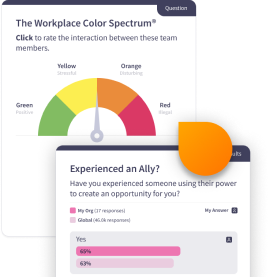
Empower employees to take action, protect culture, and prevent harm in real time.
Course Video Preview
A sales team celebrates success after close of sale, when another colleague has other ideasMost harmful workplace behavior doesn’t happen in secret — it happens in front of others. And yet people often freeze, feel unsure how to respond, or assume someone else will step in. That hesitation can erode trust, psychological safety, and team culture.
Upstander Intervention Training gives employees the practical tools and confidence to act when they witness disrespect, bias, harassment, or bullying. Instead of relying solely on HR or managers, teams learn safe, realistic ways to interrupt harmful behavior and support colleagues — reinforcing shared values and strengthening a speak-up culture.
Course Description
Rooted in Emtrain’s skills-based approach, the program introduces the 5 D’s of intervention — Delegate, Distract, Delay, Direct, and Document — as flexible strategies employees can apply in everyday situations. The result: a workplace where people feel protected, accountable to each other, and empowered to model respectful interactions.
Key Concepts
- Recognize moments where speaking up can prevent harm and reinforce culture
- Apply the 5 D’s to intervene safely and effectively in real-world scenarios
- Support colleagues and build allyship through confident, respectful action
- Build self-awareness to identify hesitation triggers and overcome the bystander effect
Course Features
- Access to our Anonymous Ask the Expert tool
- Rich video scenarios based on real-world events
- Built-in employee sentiment surveys
- 50+ Machine Translation Options
- Optional program timer
- Policy acknowledgement tool
- Extensive customization options

Lessons
Becoming Upstanders
Intervention Method: Delegate
Intervention Method: Direct
Intervention Method: Distract
Intervention Method: Delay
Intervention Method: Document
Using Multiple Intervention Methods
Provide Your Feedback
Relevant Courses
Complementary Microlessons
Recommended Resources
From ‘Ask the Expert’
Emtrain’s Ask the Expert feature enables users to ask questions about compliance, bias, harassment, and diversity & inclusion as they come up. It’s all confidential, and answers are sent straight to their inbox. View some of the example questions below and see the Experts answers.

